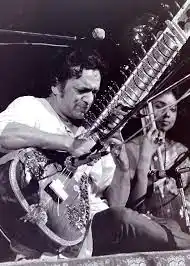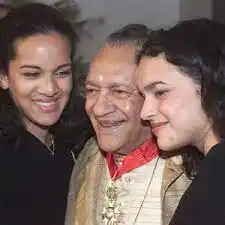Table of Contents
Biography
Indian classical music is an ancient tradition going back millennia. The latter half of the 20th century saw it becoming popular globally, with keen interest from people to listen and learn it as well. It has also had an impact on popular music as a whole, influencing the development of several genres such as psychedelia and techno.
None of this would have been possible without one man. His name was Ravi Shankar and few musicians from India have been as influential as him. A master of the sitar, he made it one of the most recognizable instruments from India. This was due to his commitment to his craft and numerous performances in India and around the world, as well as his efforts as a guru to a whole generation of musicians. He rightfully earned the epithet of ‘godfather of world music.’
Ravi Shankar was born Rabindra Shankar Chowdhury in Varanasi, Uttar Pradesh on 7 April 1920. His brother, Uday Shankar, was an accomplished dancer who is considered to be a pioneer of modern dance in India. Ravi Shankar accompanied his brother and his dance group to Paris at the age of ten. By the age of thirteen he learned how to dance and play various instruments. The dance group travelled throughout Europe and the United States, exposing the young Ravi Shankar to Western music and culture.
In 1934, Ravi Shankar heard the legendary musician Allauddin Khan perform at Calcutta. The latter was persuaded by Uday Shankar to become their soloist on their tour and trained Ravi Shankar as well. Allauddin Khan offered to take on Ravi Shankar as a disciple, on the condition that he gave up touring and immersed himself fully in musical study. Ravi Shankar took on this offer and in 1938 became the disciple of Allauddin Khan. Khan was one of the most renowned music teachers of all time and ensured all his students were rigorously trained in all elements of music.
![]()
Career
After completing his training in 1944, Ravi Shankar moved to Mumbai and joined the Indian People’s Theater Association. He began recording music for HMV India and worked as a music director for All India Radio from 1949 to 1956. In the mid-50s, he collaborated with the legendary director Satyajit Ray to compose the music for his award-winning Apu Trilogy.
In 1956, he resigned from All India Radio to start touring internationally. In the 1960s, on his first American tour, he met Richard Bock, who founded World Pacific Records, whose studios were used by bands such as The Byrds. They were immediately impressed by his musicianship and also started using the sitar in their music.
As a result of his growing network among American musicians, he performed at the famous Monterey Pop Festival in 1967. The counterculture movement of the time embraced him due to the festival and his performance was well received. The largely hippie audience were fascinated with India and Indian culture and his music was unlike anything they had heard before.
He would later perform at the American counterculture’s peak moment which was the Woodstock Festival of 1969, alongside the biggest musicians of the time such as Jimi Hendrix, Janis Joplin, The Who and Joan Baez.
Ravi Shankar’s rising prominence in the West brought him to the attention of George Harrison of The Beatles. After meeting Ravi Shankar in London in 1966, George Harrison went to India quite a few times learn the sitar from him and was very dedicated. The relationship between George Harrison and Ravi Shankar would be one of the most fruitful in musical history. George Harrison would use the sitar in several hits of The Beatles such as Norwegian Wood and Tomorrow Never Knows. This helped popularize the sitar even further and many musicians used the instrument and emulated its sound in waves of experimentation. George Harrison would be the editor of Ravi Shankar’s second autobiography Raga Mala in 1997.
He composed the music for the 1982 film Gandhi for which he was nominated for an Oscar for Best Original Music Score. His live album, Full Circle: Carnegie Hall 2000 won a Grammy for Best World Music Album.
Ravi Shankar’s final concert was with his daughter Anoushka, on 4 November 2012 at the Terrace Theater in Long Beach, California.
Death
Ravi Shankar died on 11 December 2012 at the age of 92. The 2013 edition of the Swara Samrat Festival was dedicated to him and included performances from musicians such as Hariprasad Chaurasia, Shivkumar Sharma and Zakir Hussain.
Awards
- 5 Grammy Awards-
- 1967: Best Chamber Music Performance – West Meets East (with Yehudi Menuhin)
- 1973: Album of the Year – The Concert for Bangladesh (with George Harrison)
- 2002: Best World Music Album – Full Circle: Carnegie Hall 2000
- 2013: Best World Music Album – The Living Room Sessions Pt. 1
- Padma Bhushan (1967)
- Padma Vibhushan (1981)
- Bharat Ratna (1999)
Family
Ravi Shankar’s first wife was the famed music teacher Annapurna Devi, who was the daughter of his guru Allauddin Khan. The two of them studied under him and later married. They had a son, Shubhendra Shankar who died in 1992.
He has two daughters, Norah Jones and Anoushka Shankar.
Norah Jones was born to him and Sue Jones, a producer. Norah Jones is an incredibly accomplished singer, who blends together pop and jazz. She has won nine Grammy Awards.
Anoushka Shankar was born to him and Sukanya Rajan, a tanpura player. Ravi Shankar taught her how to play the sitar and she would often accompany him on tour. Anoushka Shankar has independently made a name for herself as a sitar player but has not limited herself to Indian classical music, experimenting across genres.
![Ravi Shankar: Performer, composer, teacher, global ambassador - Rediff.com]()
Controversy
Conflict with Annapurna Devi
Annapurna Devi and Ravi Shankar both studied under her father, Allauddin Khan and would later get married. Whenever they would perform together, Annapurna Devi would get more praise and applause than Ravi Shankar and many people who saw them said she was a far better musician than he was. This would make him incredibly jealous.
Though he never said that he expected her to stop performing, Ravi Shankar would strongly hint his displeasure at her superior talent often which led to a lot of conflict. He also had many affairs.
In an effort to save their marriage, Annapurna Devi stopped performing in public. This was unfortunately in vain as Ravi Shankar would leave her for the dancer, Kamala Chakravarthy. As a result of all of this, Annapurna Devi became reclusive, cutting herself off from public life. She stopped performing altogether and would only teach music, that too very selectively. Ravi Shankar has been accused by many of robbing the world of a musical genius due to his ego.
The 1973 film Abhimaan, starring Amitabh and Jaya Bachchan was inspired by their relationship.
Check Out The Profiles of Some Other Indian Classical Musicians
Interesting Facts
- He was the only Indian performer at the generation-defining music festivals, Monterrey Pop and Woodstock. He considered performing at the latter to be one of his greatest regrets, describing it as a ‘terrifying experience’ due to so many audience members being under the influence of different substances
- Ravi Shankar was a good friend and frequent collaborator of the legendary violinist, Yehudi Menuhin
- Vilayat Khan, who was also considered one of India’s greatest sitarists, had an intense rivalry with Ravi Shankar. Ironically, Ravi Shankar initially wanted to be the disciple of Vilayat Khan’s father, Inayat Khan
- The patriotic song Sare Jahan Se Achha was set to tune by him, which many people are not aware of
- Ravi Shankar was a member of parliament in the Rajya Sabha between 1986 and 1992. He was nominated by former Prime Minister, Rajiv Gandhi
![birthday occasion]() Birthday Gifts
Birthday Gifts
![anniversary occasion]() Anniversary Gifts
Anniversary Gifts
![women]() Women
Women
![men]() Men
Men
![Couples]() Couples
Couples
![Couples]() Wedding Gifts
Wedding Gifts

 Birthday Gifts
Birthday Gifts
 Women
Women
 Men
Men
 Anniversary Gifts
Anniversary Gifts
 Wedding Gifts
Wedding Gifts


 We now support international payments
We now support international payments
